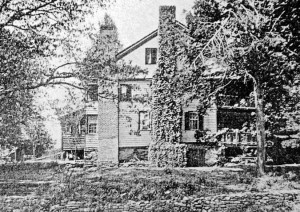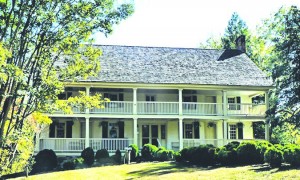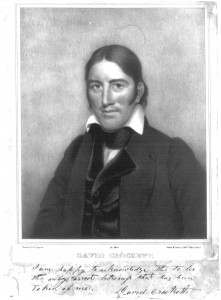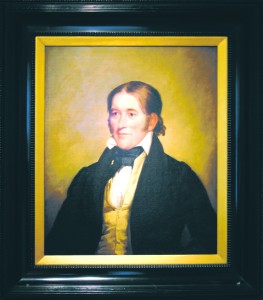
Robert Brank Vance’s attempt to slander Samuel P. Carson and his family backfired. Carson defeated Vance by a three to one margin in the 1827 race for congress. After the election Samuel Carson’s father, Col. John Carson, wrote Vance a letter. Col. Carson was outraged that Vance had called him a coward for his conduct during the Revolutionary War. The elder Carson’s letter was described as being “ill natured and abusive.” Col. Carson challenged Vance to a duel. Robert Vance wrote Col. Carson back and said, “ I can have no altercation with a man of your age; if I have aggrieved you, you certainly have some of your chivalrous sons that will protect you from insult.” Col. John Carson was furious that Vance and refused to fight him because he was too old.
Col. Carson sent General Alney Burgin to Asheville to see Vance. General Burgin asked Vance which one of Col. Carson’s sons he alluded to in his lines to his father. Vance replied, “Sam knows well enough I meant him.” General Burgin delivered the challenge and it was accepted. Samuel P. Carson wrote Robert B. Vance a letter challenging Vance to a duel. The letter was dated September 12, 1827 and written at Pleasant Gardens (between Old Fort and Marion). The letter was mailed from Jonesboro, TN so as not to break the NC law. The duel was to take place at Saluda Gap (Saluda Gap is on the NC–SC line where Henderson and Greenville Counties meet. Old US 25 from Asheville to Greenville goes through Saluda Gap). The duel would take place a few feet across the SC line. Robert Vance believed that because Samuel P. Carson was slow to anger and failed to challenge Vance to a duel when he called Carson a coward, that Carson was indeed a coward and that he had nothing to fear from Carson. So Vance was surprised when Carson challenged him to a duel.

A short time after Carson challenged him, Robert B. Vance happened to spend the night at a Morganton boarding house with Silas McDowell. McDowell was a friend of both Dr. Vance and Carson. McDowell told Dr. Vance, “Doctor, you have this day sounded the death knell over yours or Carson’s grave — perhaps both.” Vance answered, “There is no fight in Carson. I wish he would kill me; my life has no future prospect. All before me is deep dark gloom. My way to Congress has been closed forever and to fall back upon my profession or former resources of enjoyment makes me shudder to think of. Understand me McDowell, I have no wish to kill or injure Carson but I do wish for him to kill me, as perhaps it would save me from self slaughter.”
The duel was to take place on November 5, 1827. Word had spread across Western North Carolina and upper South Carolina. A large crowd gathered. David Crockett was a friend of both the Carson’s and Burgin’s. His wife’s sister had married a Burgin. Crockett had lived in Swannanoa a brief period after his marriage and maintained a cabin there that he used on frequent visits to his wife’s relatives. Davy Crockett had just been elected to Congress from West Tennessee. He had brought his wife and son, John Wesley Crockett, to Swannanoa to visit his wife’s relatives for a few weeks before he went to Washington. Crockett took ill after he got to Swannanoa. It is believed it was a recurrence of malaria. He knew Colonel Carson and his son Samuel Carson and had visited their home many times. Carson and Crockett would become best friends in Congress. Crockett would always spend several weeks at Swannanoa going to and from Congress. He would meet Sam Carson at Pleasant Gardens and they would travel to Congress together. Crockett was bed ridden yet managed to get out of his bed and went to the duel.
Samuel P. Carson chose General Alney Burgin as his second at the duel. He asked the Hon. Warren Davis of South Carolina to be his second as well. Davis was a cousin of Congressman John C. Calhoun and was “thoroughly conversant with the intricate rules of the Code Duello.” Carson chose Dr. Shuflin as his surgeon. Vance chose General Franklin Patton as his second and Doctor George Phillips as his surgeon.

The duel took place at a distance of ten paces. The firing was to be done between the words “fire, one, two, three” with rising or falling pistols. Vance chose the rising and Carson the falling mode. At the word fire, Carson sent a ball entirely through Vance’s body. The bullet entered one and a half inches above the point of the hip and lodged in the skin on the opposite side. Vance was taken to a nearby hotel where he died 32 hours after receiving his wound. Davy Crockett jumped on his horse as soon as Vance fell and headed toward Pleasant Gardens. He came up Cane Creek by Cane Creek Cemetery to Old Fort Road (which he had helped build eleven years earlier). Crockett followed it to present Hwy 9 and went down Crooked Creek (locals call it Big Hill) toward Pleasant Gardens. Samuel Carson’s daughter wrote, “David Crockett was the first man who brought the news to Pleasant Gardens. He rode his horse almost to death, beat his hat to pieces and came dashing up yelling, ‘The victory is ours!’ ”

Davy Crockett went to the Carson home in Pleasant Gardens a few days later and went with Carson to Congress. In 1831 Sam Carson married Catherine Williams. Carson and Crockett served in Congress together until 1833, when Carson was defeated for reelection. Carson was elected to the NC State Senate in 1834. He was appointed to the NC Constitutional Convention in 1835. Carson’s failing health caused him to move to Mississippi. He stayed there a short time then moved close to what is now Texarkana. He lived on what is now the Arkansas side of the line but was then believed to be part of Texas. He was elected as a delegate to the Texas Convention of 1836. Samuel Carson was a signer of both the Texas Declaration of Independence and the Texas Constitution. He was Texas’s first Secretary of State. Acting President of Texas, Davis Burdett, sent Sam Carson to Washington to secure financial aid for Texas. He was recalled because of his poor health. Samuel P. Carson died in Hot Springs, AK on November 2, 1838. v
Local historian Bruce Whitaker documents genealogy in the Fairview area.
